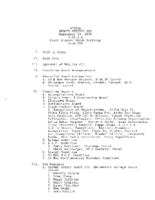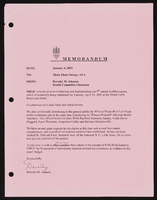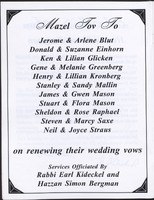Search the Special Collections and Archives Portal
Search Results

Meeting minutes for Consolidated Student Senate, University of Nevada, Las Vegas, September 18, 1979
Date
Archival Collection
Description
Text

Alpha Kappa Alpha Sorority, Theta Theta Omega Chapter health committee reports
Date
Archival Collection
Description
From the Alpha Kappa Alpha Sorority, Incorporated, Theta Theta Omega Chapter Records (MS-01014) -- Chapter records file.
Text

Program for The Wedding event at Temple Beth Sholom, June 11, 1995
Date
Archival Collection
Description
Booklet for the Wedding celebrations and vow renewals of couples at Temple Beth Sholom.
Text
John Wittwer Collection on Agriculture in Nevada
Identifier
Abstract
The John Wittwer Collection on Agriculture in Nevada (1898-1972) contains the professional papers and records of John Wittwer in his capacity as an Agricultural Extension agent for the University of Nevada from 1921 to 1954. The records are primarily annual reports containing text, photographs, newspaper clippings, and charts that provide a rich chronicle of the conditions of agriculture and ranching in southern Nevada from 1898 to 1972, with the bulk of the material dating from 1929 to 1955. These conditions span water issues, such as flood control and irrigation, to the general difficulties of sustaining agriculture and viable food production in a desert environment. The reports come from the Agricultural Experiment Stations in Clark and Lincoln counties and most contain both a statistical report and a narrative summary.
Archival Collection
Jamey Stillings Photograph Collection
Identifier
Abstract
The Jamey Stillings Photograph Collection (2009-2019) is primarily comprised of photographs taken by professional photographer, Jamey Stillings, of the Mike O’Callaghan-Pat Tillman Memorial Bridge and the Hoover Dam project, the Ivanpah Solar Electric Generating System project, and the Crescent Dunes Solar project. The Mike O’Callaghan-Pat Tillman Memorial Bridge and the Hoover Dam project depict the construction of the Mike O’Callaghan-Pat Tillman Memorial Bridge from 2009 to 2012. The Ivanpah Solar Electric Generating System project depict aerial views of Ivanpah Solar in the Mojave Desert of California from 2010 to 2014. The Crescent Dunes Solar project consists of a range of aerial and ground-based work documenting SolarReserve's Crescent Dunes Solar, a 110MW concentrated solar plant with molten salt storage near Tonopah, Nevada, from 2014 to 2015.
Archival Collection

Transcript of interview with Billy Paul Smith by Claytee White, October 3, 2013
Date
Archival Collection
Description
Chemist, mathematician, and health physicist Billy Paul Smith donates time to tutor young people in hopes of attracting more youth into the fields of math and science. Born in 1942 and schooled in segregated black schools in Shreveport, Louisiana, and Texarkana, Texas, he graduated from high school at age fifteen and enrolled at Prairie View A&M University, where he trained with the Reserve Officer Training Corps (ROTC) and earned his Bachelor’s degree in chemistry and in 1964 his Master’s degrees in chemistry and math. Most young U.S. Army officers in 1964 went to Vietnam, but Billy’s math and science background steered him to the Army Chemical Corps, where he was quickly selected to join a new team. The team was to develop responses to nuclear weapon accidents and worked under the Defense Atomic Support Agency (DASA) in Albuquerque, New Mexico. At the same time, Billy completed the Weapons Ordinance Army course on classified information relating to the U.S. nuclear weapons arsenal. In this interview, Billy talks about his service with DASA and his subsequent twenty-seven years working at the Nevada Test Site in a variety of positions with Reynolds Electrical and Engineering Company, Inc. (REECo), a company that had “percentagewise more blacks in management positions than any other [Las Vegas] company.” He experienced the quiet racism of Las Vegas residential segregation when he tried to purchase a house in a neighborhood he liked and the unexpected kindness of the REECo general manager, Ron Keen, who made sure the Smith family could live where they wanted to live. He talks about Area 51 and explains underground testing activity and offers the scientific and ecological reasons why scientists deemed Yucca Mountain safe to store nuclear waste. After retiring at fifty-two, Billy and a colleague formed an independent instrumentation company, which, from 1995–2005 provided and calibrated radiological measurement and detection instruments for the decommissioning and closure of the Rocky Flats nuclear plant in Golden, Colorado. During that time, Billy rented an apartment in Boulder, but he and Jackie maintained their Las Vegas home, where they still reside. Billy shares memories of places he and his wife used to enjoy on the Westside and tells of their longtime friends in the black community. He also talks about developing his philosophy of philanthropy through Alpha Phi Alpha Fraternity and discusses becoming a member of the Knowledge Fund Advisory Council for the Governor’s Office of Economic Development (GOED) and the advisory council for the Nevada System of Higher Education.
Text

Interview with Joyce Anne (Reese) Parkhurst, November 27, 2004
Date
Archival Collection
Description
Text

Interview with Bruce Lee Wilhelm, June 22, 2005
Date
Archival Collection
Description
Text

Interview with Raymond Chester Harbert, April 3, 2006
Date
Archival Collection
Description
Text

